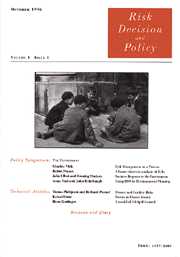Crossref Citations
This article has been cited by the following publications. This list is generated based on data provided by
Crossref.
Harris, Peter R.
and
Smith, Victoria
2005.
When the risks are low: the impact of absolute and comparative information on disturbance and understanding in US and UK samples.
Psychology & Health,
Vol. 20,
Issue. 3,
p.
319.
French, David P.
Hevey, David
Sutton, Stephen
Kinmonth, Ann Louise
and
Marteau, Theresa M.
2006.
Personal and Social Comparison Information about Health Risk.
Journal of Health Psychology,
Vol. 11,
Issue. 3,
p.
497.
Asimakopoulou, Koula G.
Skinner, T. Chas
Spimpolo, Jennifer
Marsh, Sally
and
Fox, Charles
2008.
Unrealistic pessimism about risk of coronary heart disease and stroke in patients with type 2 diabetes.
Patient Education and Counseling,
Vol. 71,
Issue. 1,
p.
95.
Fair, Anna K. I.
Murray, Peter G.
Thomas, Anna
and
Cobain, Mark R.
2008.
Using Hypothetical Data to Assess the Effect of Numerical Format and Context on the Perception of Coronary Heart Disease Risk.
American Journal of Health Promotion,
Vol. 22,
Issue. 4,
p.
291.
Moore, Don A.
and
Klein, William M.P.
2008.
Use of absolute and comparative performance feedback in absolute and comparative judgments and decisions.
Organizational Behavior and Human Decision Processes,
Vol. 107,
Issue. 1,
p.
60.
Schmiege, Sarah J.
Klein, William M. P.
and
Bryan, Angela D.
2010.
The effect of peer comparison information in the context of expert recommendations on risk perceptions and subsequent behavior.
European Journal of Social Psychology,
Vol. 40,
Issue. 5,
p.
746.
Dillard, Amanda J.
Ubel, Peter A.
Smith, Dylan M.
Zikmund-Fisher, Brian J.
Nair, Vijay
Derry, Holly A.
Zhang, Aijun
Pitsch, Rosemarie K.
Alford, Sharon Hensley
McClure, Jennifer B.
and
Fagerlin, Angela
2011.
The Distinct Role of Comparative Risk Perceptions in a Breast Cancer Prevention Program.
Annals of Behavioral Medicine,
Vol. 42,
Issue. 2,
p.
262.
Rose, Jason P
and
Nagel, Barbara
2013.
Relation between comparative risk, absolute risk, and worry: The role of handedness strength.
Journal of Health Psychology,
Vol. 18,
Issue. 7,
p.
866.
Gamp, Martina
and
Renner, Britta
2016.
Pre‐Feedback Risk Expectancies and Reception of Low‐Risk Health Feedback: Absolute and Comparative Lack of Reassurance.
Applied Psychology: Health and Well-Being,
Vol. 8,
Issue. 3,
p.
364.
Miller, Jane E.
Windschitl, Paul D.
Treat, Teresa A.
and
Scherer, Aaron M.
2020.
Comparisons as Predictors of People’s Beliefs About the Importance of Changing Their Health Behaviors.
European Journal of Health Psychology,
Vol. 27,
Issue. 1,
p.
14.
Harvey, Annelie J.
and
Keyes, Helen
2020.
How do I compare thee? An evidence-based approach to the presentation of class comparison information to students using Dashboard.
Innovations in Education and Teaching International,
Vol. 57,
Issue. 2,
p.
163.
Rose, Jason P.
and
Edmonds, Keith A.
2021.
Social Comparisons for Following Health Recommendations and Their Relation to Worry and Intentions During COVID-19.
European Journal of Health Psychology,
Vol. 28,
Issue. 4,
p.
141.
Abdulhalim, Hisham
Kim, Byungyeon
Ofek, Elie
Shalev, Adi
and
Tron, Talia
2024.
Deep Learning in the Service of Customer Service: The Value of AI-Enabled Timely Performance Feedback.
SSRN Electronic Journal,


